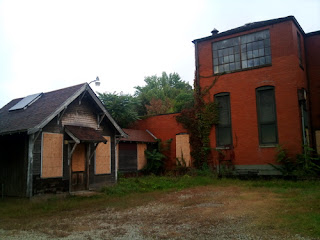The first scarlet leaves fall on our red brick roadway at the vineyard in Canton. Heading home, this first drizzly day of October, I crave cider and cinnamon rolls.
Shortening days and vacating sunlight also create an irrational, visceral need to acquire Indian corn, warty pumpkins, twisty gourds, and quite possibly, straw bales.
These needs will best be met by a back road, I decide. No harm, no foul Interstate 77 and your big box beckonings.
My road home today has many names. In Akron it is Canton Road, further north, Darrow Road or Route 91. But it starts down here as Main Street, in North Canton, which used to be New Berlin. In other places it is the Cleveland Road. Confused yet?
 |
| New Berlin Bubbles and Suds |
The road rolls north. Nurseries pile mums roadside to lure shoppers, trees and shrubs offered at fire sale prices. Hand stenciled signs every so often announce the Haunted Schoolhouse and Laboratory, now open on Triplett Boulevard for the season. Imperceptibly, North Canton ends, Main Street becomes Cleveland Road, and we are in the Western Reserve crossroads burgh of Greentown.
 |
| Old brick house on the Cleveland Road. |
On the outskirts of Greentown, of course, is a custard stand, closed for the season. It may be called the Dari Delite, the Sundae Isle or the Creamette, but every middling Buckeye State burgh seems to have one, often with coney dogs.
More suburbs, more farms, more patches of lake. The road charges north, in aptly named Lake Township, toward the next crossroads, Uniontown. Bledsoe's butcher shop, to which we used to make semi annual pilgrimages from Summit County to stock our chest freezer, still stands in the wood frame storefront at the corner: deer processing, Trail bologna, sauerkraut balls. The red stripes on a barber pole, another American flag, a stop sign: vivid red under a fine Scottish mist.
An impressive water tower rises over a handsome cemetery, where Uniontown's turn of the century elite rest under picturesque, well-groomed hillocks. The dogwood leaves are now crimson.
At Beiler's, piles of pumpkins, strands of Indian corn, trays of fluffy rolls oozing with thick white icing lure me. Pecks of peaches, bushels of plums, canning jars and paraffin wax reassure me with their abundance, but portend a season's death.
Crossing the Tuscaraurus, we arrive in Summit County. Lake Tim Kam Park, one of those old time concrete-bottomed swimming lakes, is a ghost of simpler summer pleasure, diving boards stowed for the season, grassy beach empty of bathers.
Another township crossroads, and the old Springfield Township High School, with exuberant polychromatic art deco tile work, appears not much longer for this world. I imagine this rural school district in 1931, stolid school board members peering through wire framed glasses at architect renderings. I admire their moxie for fronting the county's main road with moderne exuberance in a dismal year. I can already tell, the state-funded replacement building, soon to rise here, will lack all such grace notes. Another red brick school house bites the dust.
On the trail of things that are lost, things that are vanishing, things that even now slip from my memory, like barely remembered childhood trips to Uniontown, to buy paper-wrapped steaks. This first day of a new month, when the season announces its change with insistent gray drizzle, a month that will end with us singing that mighty hymn, to All The Saints Who From Their Labors Rest.
So of course I find myself, guided as if by divining rods, to the old county sanitarium and TB asylum, now fenced off and weed-choked. I park at the Methodist church and walk, camera phone in hand, as a nice Methodist lady arrives to deposit her neatly bundled Methodist newspapers in the Methodist recycling bin. She mouths hello warmly and eyes me warily, simultaneously, as Methodists will.
Soggy sod sinks under now-saturated boots, the sky so dark and the atmosphere so thick, photos barely register. This ghost of a place. I can almost hear the rain seep into crumbling mortar, as the place sags perceptibly. Soon, the name Sanitarium Road will be all that is left.
Back on the Canton Road, through the community of Ellet. All is more familiar now, though I wonder where is Arnold's, where we stopped on the way to visit my grandmother Hildegarde, to buy peanut brittle. Ernest Angley's Grace Cathedral still rises here, testament to a time when Akron was a boom town, with so many transplanted Southerners that tent preachers like Angley and Humbard cast aside their tent poles to construct elaborate cathedrals.
Sometimes on a rainy Saturday, you take the back roads, in order to feel one township fold into the next. You stop at the crossroads. You buy sticky buns and pumpkins. You make note of things that have changed, seek out things that are vanishing, give thanks for what is still there to help you remember.
This road. Just a way home from work. Nothing special about it, but on every mile, something to remind me. Canton Road. Or Cleveland Road. It depends on your destination. I have acquired, somewhere along the way, an irrational trunk full of gourds and pumpkins and straw and pie. Time to go home, and construct a shrine to autumn. The vestigial remnant, perhaps, of an ancient seasonal ritual, to ward off gelid conditions, to give thanks for abundance, to mark another season’s passing.





















































